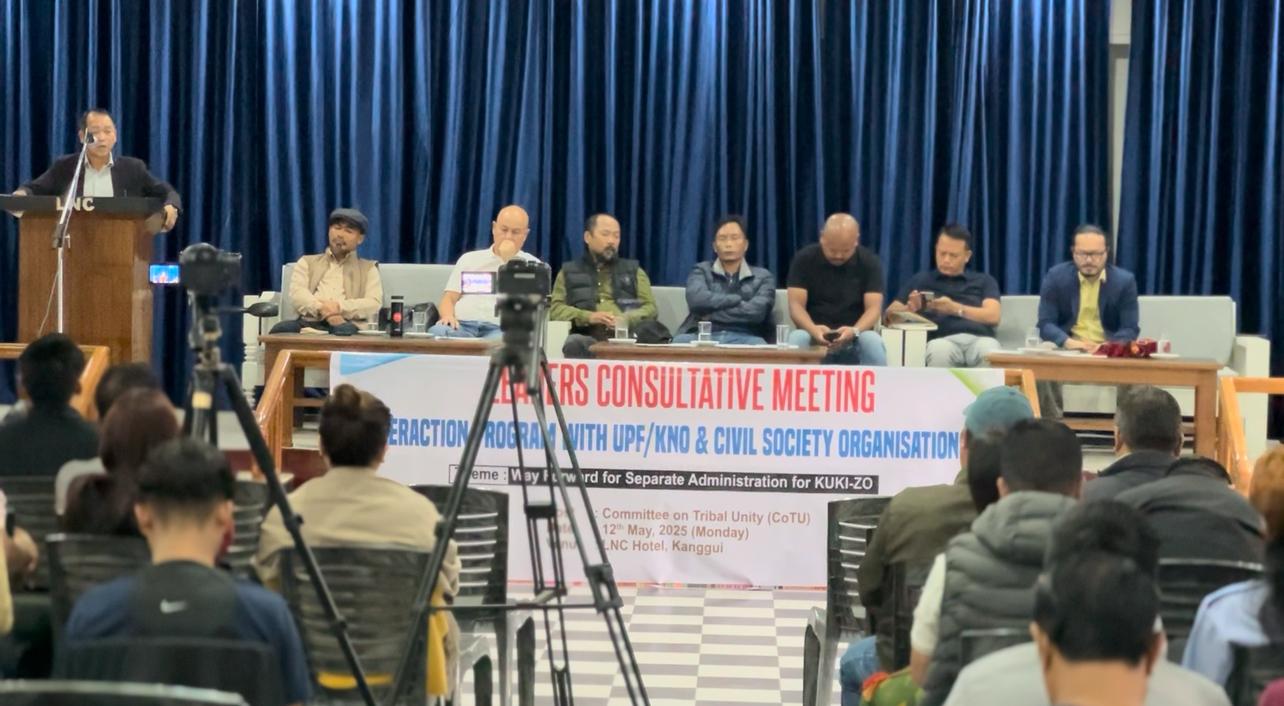
As national attention turns to the tensions on the India–Pakistan western front, a powerful voice from India’s Northeast Sadar Hills, Kangpokpi has reminded the country of an ongoing crisis much closer to home.
The Kuki-Zo community—through a high-stakes leaders' consultation—made a heartfelt appeal to the Centre not to lose sight of the two years of unrest in Manipur, the strife-torn state in the Northeast.
On Monday, the Committee on Tribal Unity (CoTU) convened a high-level Leaders’ Consultation and Interaction Program with the United People's Front (UPF), the Kuki National Organisation (KNO), and representatives from various Civil Society Organisations (CSOs), renewing its call for urgent political resolution.
The event was held under the theme: “Deliberate on the Status of Political Negotiations and Way Forward for Separate Administration, Key Social Concerns and Cohesion, Inclusive Strategies for Kuki-Zo (Way-Forward).”
Held at LNC Hotel, Kangpokpi District Headquarters, the meeting aimed to foster dialogue and unity within the Kuki-Zo community. It served as a vital platform for deliberation, bringing together prominent leaders and community stakeholders—including village chiefs, Kuki Inpi leaders, representatives of various tribe organisations in the district, student bodies, women’s groups, youth leaders, and others—to discuss pressing issues affecting the Kuki-Zo people.
Chief among the agenda items were the ongoing stalled political negotiations with the Centre and charting a course for a Separate Administration for the Kuki-Zo. In addition, the consultation addressed key social concerns, community cohesion, and the formulation of inclusive strategies for the way forward.
Following the keynote address by CoTU Chairman Thanglen Kipgen, Kuki National Organization (KNO) Spokesperson Dr. Seilen Haokip and United People's Front (UPF) Spokesperson Aaron Kipgen addressed key issues surrounding the ongoing conflict between the Kuki-Zo and Meitei communities. They spoke on the root causes of the conflict, the policies of the Government of Manipur with regard to political dialogue, the urgent need for the resettlement of Kuki-Zo villages destroyed during the conflict, and the immediate resolution of the Kuki-Zo political demand — specifically, the creation of a Union Territory with Legislature as modeled under Article 239-A of the Constitution.
Other speakers included Thangminlen Kipgen, President of Kuki Inpi Sadar Hills; Hejang Misao, a prominent Kuki-Zo social activist; Paojakhup Guite, President of KSO Delhi; and Mangboi Haokip, President of the Kuki National Assembly (KNA). They were joined by several other prominent Kuki-Zo leaders, intellectuals, student representatives, and representatives of tribe organizations, all of whom shared their insights on the way forward for the community during the consultation and interaction program.
According to the committee, the consultation and interaction represent a crucial step in shaping a more harmonious and effective future for the Kuki-Zo people, highlighting that “this is not just a meeting—it is a message to Delhi that the Kuki-Zo struggle is far from over.”
It also underscored the importance of mutual understanding and collective engagement, reflecting a broader effort to unify voices and strengthen community resolve amid ongoing political challenges.
As Manipur enters its third year of ethnic and political unrest, the Kuki-Zo community’s cry for recognition and resolution grows louder—even as the rest of the country looks to the Western front.

The Hills Journal
K. Salbung, Churachandpur
Manipur-795128